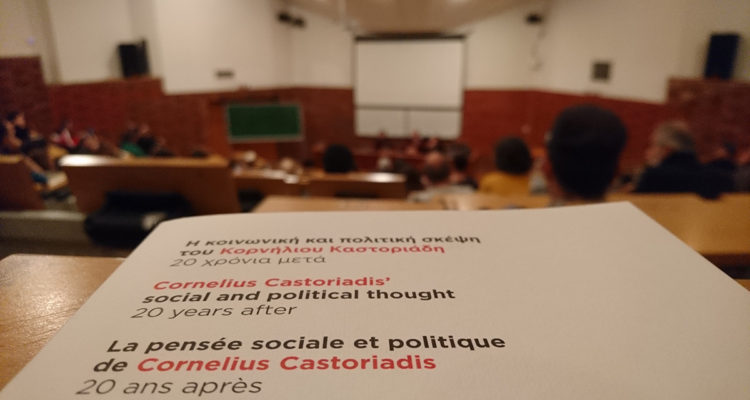Report from the Conference “Cornelius Castoriadis 20 Years Later”

In the beginning of December (1, 2 and 3) was held the transnational conference ” Cornelius Castoriadis 20 Years Later”. The three-day session took place in the Panteion University of Athens. The attendance was very high and spread beyond academic circles, attracting activists from social movements, as well as concerned citizens. This huge interest was expected, considering the dimensions of the conference: lectures were given in three languages (Greek, English and French) by 65 speakers from 7 countries (Greece, Cyprus, Belgium, Bulgaria, Argentina, Qatar and Norway). And the topics varied significantly: from psychoanalysis and biology to contemporary issues of crucial importance like climate change and migration, all viewed through the prism of Castoriadis’ thought. The conference created festive atmosphere with various groups of people scattered around the university’s hallways, discussing and debating, surrounded by tables with radical literature on the ideas of the great philosopher.
Unlike other academic conferences that tend to “sterilize” ideas, this time the situation was different. All talks sooner or later were reaching to the question of radical transformation through the project of social and individual autonomy (central concept in Castoriadis’ work). And this should not surprise us since the thought of Castoriadis always revolved around politics and revolutionary praxis. Thus the papers presented during the conference could be useful not only for academic research, but also for political action.
TRISE member Yavor Tarinski was among the keynote speakers. He gave a speech on the importance of self-limitation as inseparable part of direct democracy, a topic that was essential for Castoriadis’ understanding of democratic politics. Tarinski explained that unlike the limitations of today, predetermined and unchallengeable, the ones that take place in democracy are self-imposed collectively by all members of society and thus are open to alteration, or in other words – self-limitation. Although every society sets certain limits to its individual members, this does not mean that they will necessarily sustain themselves within the given prohibitive frame, in which case direct democracy allows the attempt at convincing large enough segment of the population to change or expand certain limits, instead of directly outlawing or forbidding dissent. Tarinski concluded that self-limitation might be our only hope to preserve the fragile planetary conditions that allow us to exist, whom the current system is in the process of destroying.
Web page of the conference: https://castoriadis2017.blogspot.gr/

Poster of the conference

Leave a Reply